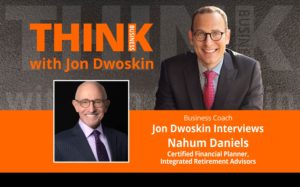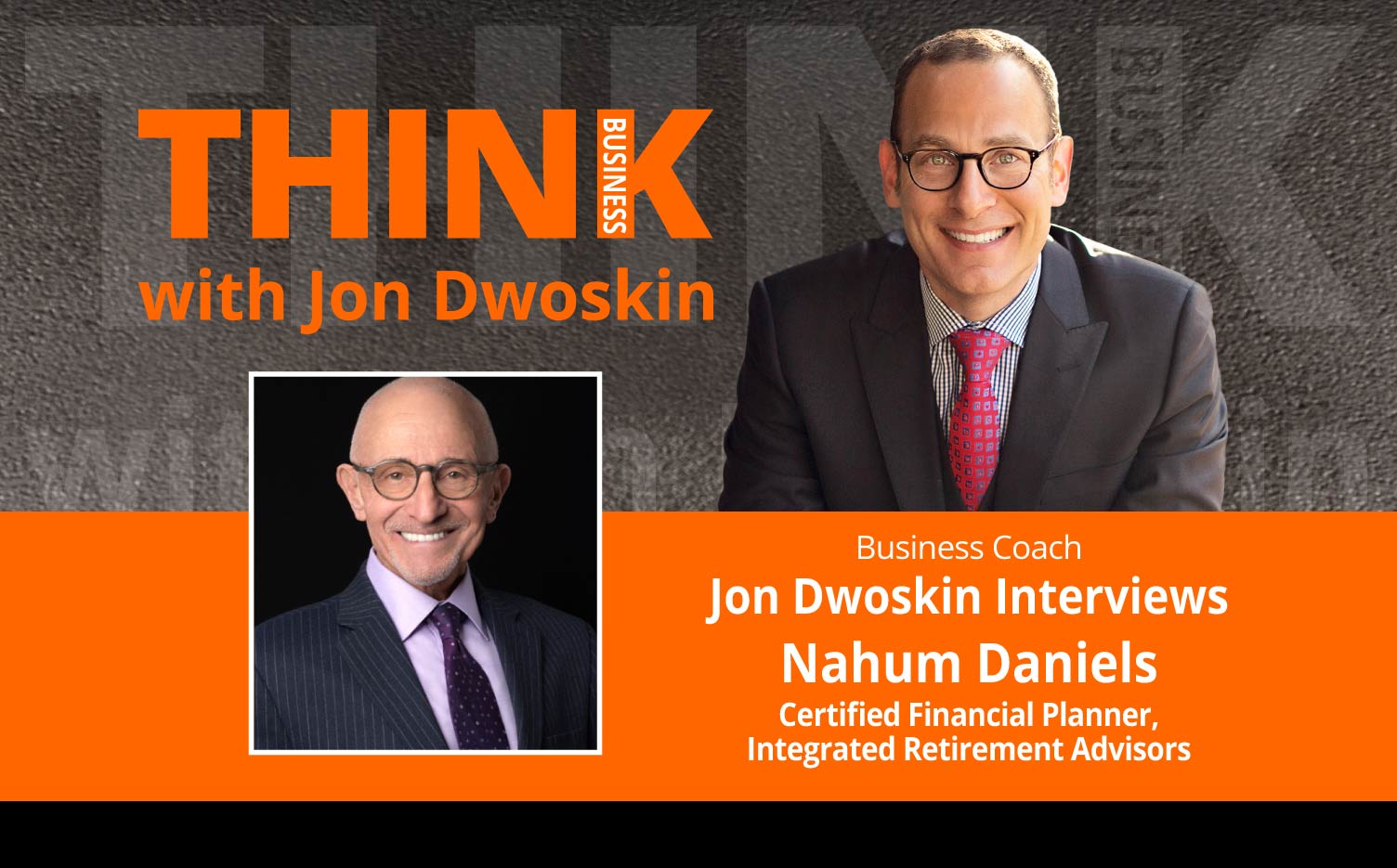
Nahum Daniels was interviewed recently by Jon Dwoskin on his THINK BUSINESS* podcast. You can listen to the entire podcast here: https://jondwoskin.com/2019/11/jon-dwoskin-interviews-nahum-daniels-certified-financial-planner-integrated-retirement-advisors/ THINK BUSINESS* is Jon Dowskin’s 1:1 in-depth and soulful conversations with executives, managers and sales people who are making a difference in their companies, communities and in themselves.
————————————————————————————————————————————–
Here are a few of the points made during the interview:
“I’ve been an entrepreneur all my life,” says Nahum Daniels. “I was originally in the publishing business. Early on in my career, I spent seven or eight years living in Japan. That was back in the 1970s, and I published a book which was at that time considered to be “alternative lifestyle” focused. The book was called The Book of Tofu, and it ended up changing everything in the American food retail industry. Today, you’ll find multiple types of tofu sold in every grocery store; you can’t escape it. But back then, prior to the book, no one even knew what tofu was.”
“That’s the power of the written word,” Nahum continues; “It can change an entire culture.”
Nahum spent more than a year writing his book, Retire Reset! What you need to know and your retirement advisor might not be telling you.
In the early 1980s, Nahum met Bill Gates through one of his Japanese business contacts. He ended up working for Microsoft, before it was a public company, back when it was a small start-up. At that time, PCs were just being launched, and computer books were extremely technical, complex and filled with jargon. It was Nahum’s task to revamp the books’ content and design to appeal to consumers as Microsoft set out to lead the way in the personal computing industry.
As a business mentor, Nahum found Bill Gates to be a very focused leader. “He totally concentrated on the people he was working with, and was highly-attuned to both their needs and his business objectives. He was at the leading edge of innovation and had a view of what the future looked like,” Nahum explains.
“Bill is a very unique individual. By the time he reached high school, he was spending the majority of his time programming and coding. At a very early age, he had a sense of the tremendous power of the personal computer. He wanted to make sure the future happened; he was out to reshape the world and he wasn’t afraid to be an entrepreneur or leader,” says Nahum.
Later on, Nahum Daniels moved from book publishing and personal computing into financial world, specifically retirement planning. But he found himself writing and publishing again [the book, Retire Reset!] when he realized how much complacency there was in the financial industry around the subject of retirement.
“Since the 1990s we’ve been taught by the financial industry that retirement planning involves investing in a mix of stocks and bonds comprising a “balanced portfolio” and expecting the best. Standard performance expectations for securities or stocks range from 9-12% returns per year, while bonds are expected to return 4-5% per year.”
“I make the case in my book that we may be facing a span of a decade or more of extremely low returns, much lower than these projections,” says Nahum.
“People need to spend more time focusing on this. We need to learn to see the alternative scenarios that might unfold, and adapt and hedge against them, achieving financial objectives even if lesser returns materialize going forward. This is essential to retirement planning and portfolio construction specifically for retirement.”
“We need to reorient. People are living much longer, but Americans think short term—only to the next month or quarter,” Nahum continues.
“Retirement planning is all about thinking 50 years down the road.”
“Even most financial advisors have not really made a scientific study out of how to create a portfolio that works this long, which puts us at a disadvantage. With interest rates dropping lower—getting close to zero, or even negative like Germany or Japan—we can’t get yield or income from our assets. How will we have enough cash flow without spending down our capital?”
“Writing my book allowed me to study the industry icons who have analyzed markets and done in-depth research on returns. They have uncovered options and they’ve run the calculations to show that some alternatives to the stocks/bonds scenario may perform better for retirees through time. That’s what I help people with.”

